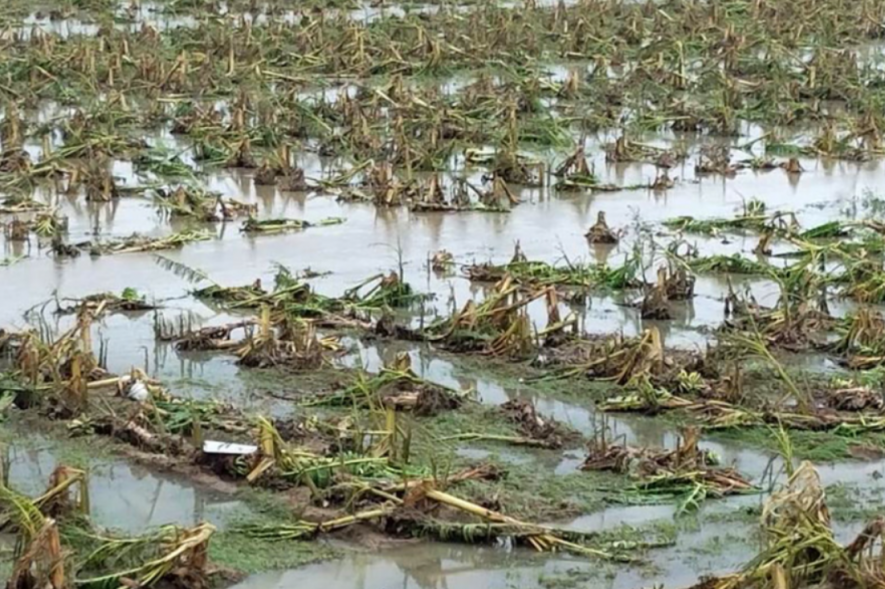Catastrophic Impact of Untimely Rainfall on Agriculture in West Bengal

Representational use only.Image Courtesy: Flickr
Kolkata: The untimely rain in December in West Bengal has led to a catastrophic impact on agriculture in the state. In the rice bowl of the state, Burdwan, farmers are at a loss as they consider ways to cope with the damage. Rainwater has inundated the fields, and the Kharif rice, yet to be cut, is still in the fields.
The high-yielding variety of paddy that is generally cultivated in West Bengal cannot withstand water in the fields for more than eight hours at a stretch. Therefore, many farmers who were waiting for the price of the paddy to rise are now facing exorbitant losses. NewsClick spoke with Asit Shit, a farmer from Memary in Burdwan who had sown the khas variety of paddy in the fields. He said, “The loss is enormous. In my seven bighas of land, more than lakhs worth of paddy has been damaged. I had taken a loan from a microfinance organisation to sow the rice and am now unable to repay the debt.”
In the neighbouring Hooghly district, where about 4 lakh hectares of land is arable, the condition is even worse. In about 2 lakh acres, farmers were waiting for the potato harvest. However, potato plants cannot withstand rain after they have already been sown. The roots will decay, leading to low-quality yields, said Bhaktaram Pan, district president of All India Kisan Sabha (AIKS).
“This rainfall, which happened for two days at a stretch, will also damage the vegetables and the onion cultivators are now also worried about their crop. Overall, more than 4 lakh people in the district, all cultivators, will be affected by this untimely rainfall. AIKS has asked all its units to go among the cultivators, take stock of the situation, and if necessary, contact the deputy director of agriculture in the blocks and file for crop damage,” he told NewsClick.
Farmers, especially tenant farmers, from Northern districts of West Bengal are also staring at a crisis due to the sudden rain.
The rainfall started on the morning of December 6. The weather department’s District Level Weather Forecast for Gangetic West Bengal reported “light to moderate rain with thunder” in the districts of West Bengal on December 7. There will be “light rain with thunder” in Murshidabad and Nadia District on December 8.
This is the season of aman rice but rain shattered all hopes of Mainuddin Haq, a small farmer from Tildanga village, Farakka, who cultivated paddy on two bighas of land. “Due to a lack of rain, I have faced loss the previous year. Two days back, I cut the paddy and piled it up just beside the field. After the rain started, we tried to cover it with a plastic sheet, but it hasn’t helped much,” said Mainuddin.
Mainuddin hopes that he can save 50% of the total cultivation. But his neighbour, Moinul Haq, could not cut any paddy at all. He cultivated paddy on four bighas of land, and the paddy is still in the fields.
Kabatulla Mian, a tenant farmer from Nabagram, Murshidabad, is also facing a huge loss this year due to this rain. He cultivated paddy on four bighas of land. He said that for each bigha, he invested Rs 8,000. He was expecting six quintals of paddy. “I have committed to pay three quintals of paddy to the landlord. But this rain has destroyed the paddy in the field,” he said.
The farmers from Kiriteshwari Gram Panchayat and Narayanpur Gram Panchayat of Nabagram block are facing a similar predicament.
In this Kharif season, due to bacterial leaf blight (popularly known as Jhalsa Rog), paddy production is reduced. The paddy market is also not doing well. The West Bengal government has promised to purchase paddy through Kishan Mandis, run under the Department of Food and Supplies, at a rate of Rs 2,203 per quintal. But till now, only 11,11,857 farmers have registered on the e-paddy website. Due to “link failures” and technical issues, many farmers could not register on the e-paddy website. Farmers have alleged that they had to pay brokers in many cases. So, they lost interest in selling paddy to the Kishan Mandis. Tenant farmers are also deprived of that option as they own no land. They said they plan to sell paddy at Rs 1,600 to 1,800 per quintal in the open market.
Those who were done with paddy cultivation have now planted mustard in their fields. Unfortunately, the rain is causing damage to the mature mustard plants as water is lodged in the field. Bikash Mondal from Hariharapara, Murshidabad has cultivated mustard and said, "Due to rain, the flowers of mustard are falling."
Get the latest reports & analysis with people's perspective on Protests, movements & deep analytical videos, discussions of the current affairs in your Telegram app. Subscribe to NewsClick's Telegram channel & get Real-Time updates on stories, as they get published on our website.























